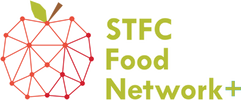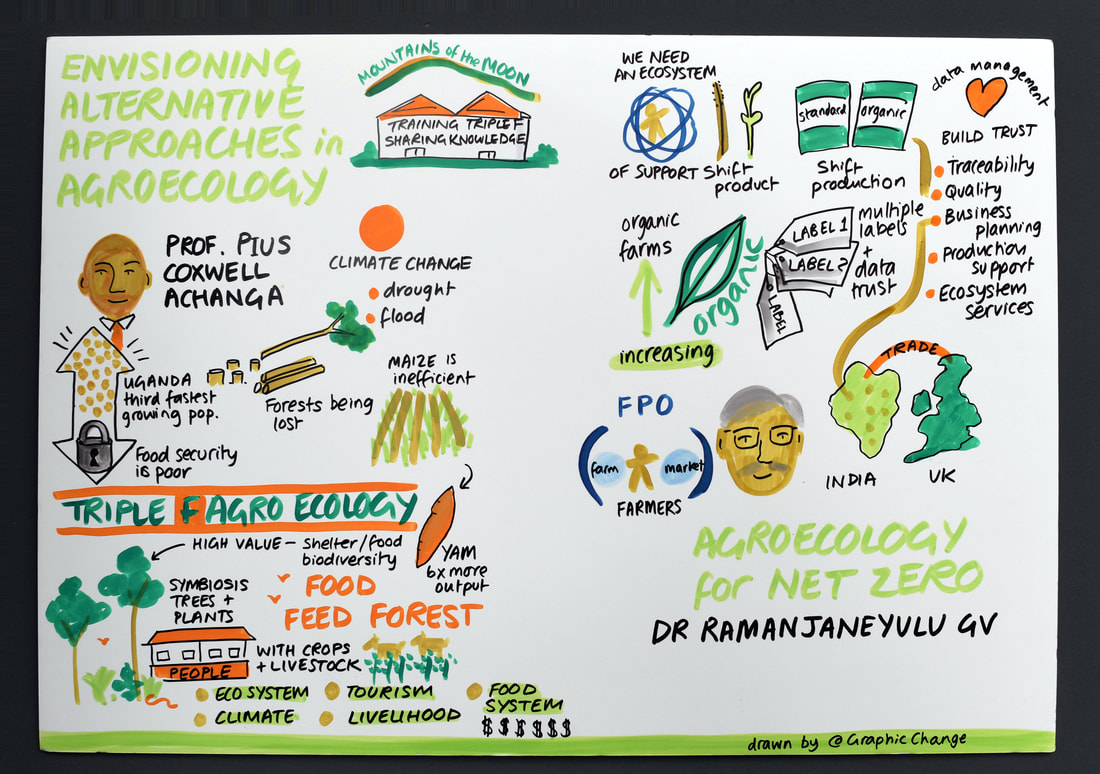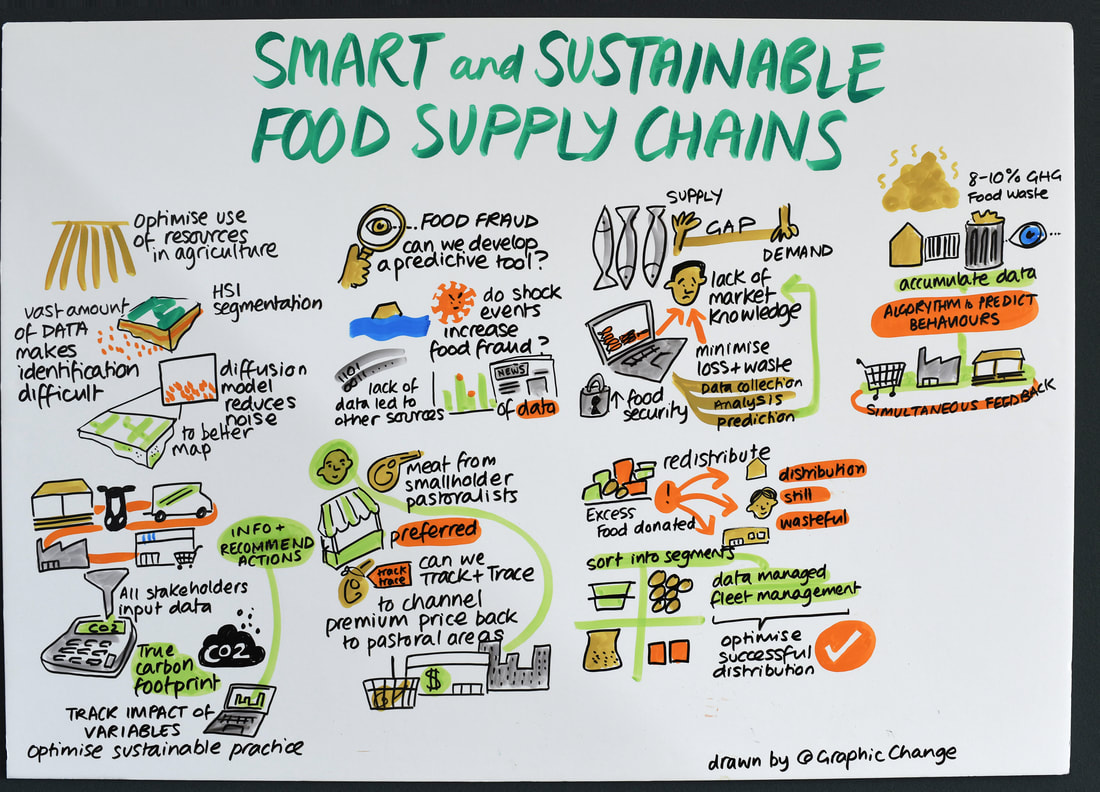|
Efforts to increase food security often focus either on the production side or consumer behaviour. But the supply chains linking the two can have an enormous impact on how resilient food systems are – as demonstrated all too well during the disruption of the COVID-19 pandemic. Besides this, the global and often highly distributed nature of food supply chains means these offer countless intervention points to improve the sustainability and social benefits of food products. At the STFC Food Network+ (SFN+) 2023 Annual Conference, seven innovative projects supported by the network were presented during the session ‘Smart and Sustainable Food Supply Chains.’ Together, these demonstrate the value in focusing on the entire journey from farm to fork, and in particular, the transformative potential that STFC capabilities in data science could bring to food supply chains. UK-India bilateral trade: Measuring and monitoring Net Zero Food Trade PI: Dr Ramanjaneyulu GV, Centre for Sustainable Agriculture Shifting to organic farming could play a major role in helping India to achieve Net Zero targets. A key driver would be access to lucrative organic export markets (including the UK), however this is currently hindered by a lack of harmonised compliance systems and a multiplicity of different sustainability labelling schemes. This project is addressing this by building a user-friendly data stack, called eKrishi, which will draw data on ecosystem services, traceability, and quality assurance into one place. The intention is that this will facilitate data management for harmonised quality assurance systems, link food producers to markets, and provide data to support effective policy decisions. The team are also working with Farmer Producer Organisations to specifically reach smallholder farmers, by providing advisory services and business development. ‘If we are to help developing countries to transition to more sustainable food production at farm level, we need to create an ecosystem to help them access the premium market for sustainable products more easily. In this sense, the trade between the UK and India could be an important lever for change.’ Dr Ramanjaneyulu GV Fraud Indicators: Winning the War against Food Fraud with STFC Data Science PI: Dr Edward Smart, The University of Portsmouth Sudden shock events, such as the COVID-19 pandemic, can prompt a surge in food fraud activities, which pose significant risks for public health and the environment. But what if food-related data streams could be harnessed to detect fraud in real-time? Using STFC data science expertise and the DAFNI computing cluster, this project sought to establish whether this could be feasible using currently available data. This revealed, however, that fraud-related data sets are currently too limited and heterogenous to develop advanced analytical tools. Using this insight, the team were able to secure additional grants from the Food Standards Agency and Innovate UK to estimate the true cost of food crime in the UK, and to investigate how AI-powered tools could help food producers better manage food fraud risks in their supply chains. Developing a data-driven communication platform for improving farmed fish distribution in Kenya PI: Dr Mary Opiyo Farmed fish could provide a valuable source of protein and micronutrients to address food security concerns in Eastern Africa. But currently, inefficient supply chains mean that farmers struggle to find buyers in time, resulting in high levels of post-harvest losses and wastage. This project aims to address this by developing a user-friendly communication platform that will directly link fish farmers and market traders in Kenya. Through carrying out interviews and online surveys with over a hundred stakeholders, the team have established the critical challenges on both the demand and supply sides, and the key features a digital trading platform should have. They are now working to integrate the platform with databases using cloud services, to provide users with real-time data on farmed fish supplies and market prices. ‘In the long term, we intend to use advanced analytics methods such as statistics, machine learning, and other AI-based techniques, to generate new insights or deeper knowledge about the underlying problems affecting farmed fish distribution in Kenya.’ Dr Mary Opiyo and Dr Baris Yuce Building a Food Waste Tracker for Responsible Consumption and Sustainability Enhancement PI Dr Shuyang Li, Uni of Sheffield An estimated 6.6 million tonnes of household food are wasted in the UK every year (WRAP 2018). A key problem is a lack of joined-up data streams between consumers and retailers to identify inefficiencies in supply chains. This project is tackling this by engaging major supermarkets and local food producers to build integrated databases that can be used with AI-powered algorithms to track and reduce food waste across the entire food system. In parallel, the team are working on an app for consumers that will help them keep track of their food purchasing and food wastage behaviours. With AI-based algorithms, the app will analyse each consumer’s behaviour to recommend specific actions to reduce food waste, whilst providing simultaneous feedback to retailers. Integrating optimisation modelling with STFC DAFNI Platform to minimise waste in collection and redistribution of food surplus in Southeast Asia PI: Dr Vahid Akbari, The University of Nottingham Redistributing surplus food can play an important role in reducing food waste whilst improving food security for the most vulnerable. But due to the demand for and supply of surplus food being so unpredictable, redistribution organisations face serious logistical challenges that can result in wastage. This project is exploring whether food redistribution chains in Southeast Asia can be optimised by coupling them to real-time data enabled by Internet of Things (IoT) technologies. It builds on previous work by the team which developed an IoT-enabled weighing scale to measure and categorise food donations for a Bangkok-based NGO. Going forward, the team aim to analyse recorded data using the STFC DAFNI platform to develop machine learning models capable of providing forecasts of donations and demand. This could allow data-driven fleet management decisions, leading to reduced food loss. ‘Having a better forecast of demand and supply values for surplus food will enable redistribution organisations to design more accurate routes, which in turn would minimize food loss while maximizing donation redistributions.’ Dr Vahid Akbari Blockchain enabled Cloud Computing based integrated Carbon Calculator (Be4C) PI: Dr Sushma Kumari, The University of Hull We all know that beef cattle have a disproportionately large carbon footprint, creating an urgent need for more sustainable farming practices. However, we currently lack a holistic beef carbon calculator that encompasses the entire supply chain, rather than just parts of it in isolation. This proof-of-concept project is investigating the feasibility of developing a comprehensive beef carbon calculator that considers everything from the breed of cattle, to transport, storage, and packaging. A key innovation is to base this on blockchain technology, allowing distributed stakeholders to input their data right across the supply chain. The overall aim is to develop an interface that can provide accurate carbon calculations for different beef products, and make tailored recommendations on how to lower these. Exploring the feasibility of Geographic Indication marketing to improve pastoral livestock marketing in Kenya PI: Dr Aditya Parmar, The University of Greenwich In Kenya, sheep and cattle products produced by traditional pastoralist communities are highly sought by consumers, due to their distinct flavour qualities. However, there is currently no market structure or traceability scheme to enable these farmers to command a premium price for their products. This proof-of-concept project is investigating whether a track and trace system (potentially linked to an IoT and blockchain system) could facilitate a Geographic Indication (GI) scheme, similar to those in Western markets. Through structured interviews and surveys in the Marsabit County of Kenya, the team have confirmed a high interest among stakeholders in such a scheme. Current challenges, however, include limited knowledge on the GI marketing concept, and the lack of an ability to scientifically trace livestock products. ‘We are now investigating how GI schemes could be integrated into existing plans for development in these regions, such as county livestock development agendas, national traceability strategies, and work to promote the goat and sheep value chain.’ Dr Aditya Parmar You can watch the session ‘Smart and Sustainable Food Supply Chains’ here (presentations are given between 01:38:48 and 02:18:40). Over the next few months, we will be showcasing more of the sessions from the SFN+ 2023 Annual Conference. To keep updated about new posts, you can sign up to receive the monthly SFN+ email newsletter.
0 Comments
Your comment will be posted after it is approved.
Leave a Reply. |
AuthorJune 2024 - Archives
June 2024
Categories |
- Home
- Webinars and Events
- About the SFN+
- News
- Blog
- Expert Working Groups
- Funding
-
Publications
- Bioeconomy positioning paper
- SFN+ 5th Annual Conference
- OMM Policy Report
- ‘Multi-Stakeholder International One Day Workshop on Organic Agri-Food Value Chains for Net Zero’ Report
- SFN 2050 UK Net Zero Food report
- Sustainable Cold Food Chain Booklet
- Food Sensing Technologies for Safe and Nutritious Food
- Sustainable urban and vertical farming
- Projects
- Join/Contact Us



 RSS Feed
RSS Feed


